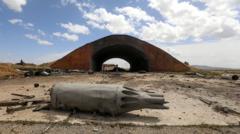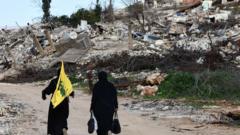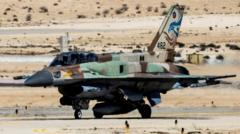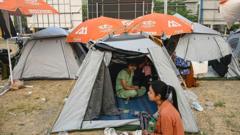Israel's recent air strikes on military targets in Syria, including key airports, highlight a significant shift in regional dynamics, particularly concerning Turkey's budding defense collaboration with Syria's interim government. With both nations exchanging accusations, the fragile security landscape in Syria becomes increasingly complicated as external forces scramble for dominance.
Rising Tensions: Israel's Air Strikes on Syria Signal Warning for Turkey

Rising Tensions: Israel's Air Strikes on Syria Signal Warning for Turkey
An alarming escalation in Israel's military operations in Syria reveals escalating tensions with Turkey, as regional powers vie for influence in the war-torn nation.
In a dramatic display of military might, Israel launched aerial attacks on several Syrian military installations Wednesday night, significantly impacting Hama military airport and T4 base near Homs. Syria's foreign ministry lamented that the bombardment decimated the Hama base and reported casualties, including the deaths of four defense officials and injuries to many others. Although the strikes were aimed at Syria, analysts suggest the true target was Turkey, which is seeking a security alliance with Syria’s interim president, Ahmed al-Sharaa.
In the wake of the air strikes, Israeli officials accused Turkey of further complicating the conflict in Syria, and Israel's defense minister issued strong warnings against Turkey's involvement. With Ankara reportedly acquiring plans to station air assets in Syria, including at T4 and Aleppo, military experts noted that Israel's assaults might be calibrated to avoid escalating into direct confrontation.
Relations between Turkey and Israel have soured since the onset of the recent Gaza conflict, leading Ankara to levy trade restrictions and denounce Israel's actions as genocidal. Turkey's foreign ministry responded to the strikes by condemning Israel for worsening regional instability, asserting that Israeli actions represent a significant threat to the area’s security. Despite rising tensions, Turkish officials refuted any desire for a direct clash with Israel, underscoring Syria’s right to govern itself independently.
The newly appointed Syrian leadership, under al-Sharaa, has expressed intentions to stabilize internal conflicts while fostering diplomacy, even hinting at potential normalization with Israel down the line. However, Israel's ongoing military interventions complicate matters, as these offensives, which aim to thwart enemy weaponry from reaching groups like Hezbollah, risk inflaming Syria's turmoil further both externally and internally.
Since the toppling of Bashar al-Assad four months ago, Israel has persisted in targeting Syrian military assets, conducting numerous incursions into southwestern Syria. Civilians in areas like Deraa have been caught in these military operations, resulting in tragic loss of life and calls for jihad against Israeli forces from local mosques.
Despite high hopes of a more peaceful relationship with Israel following Assad's fall, many Syrians find themselves disillusioned by Israel's continued aggression, viewing it as a push against the Syrian populace rather than solely Assad's regime. Internal strife is exacerbated by the protracted legacy of Assad's oppressive rule, as sectarian tensions threaten the veneer of unity under al-Sharaa.
As both Turkey and Israel position themselves amid the fragile political landscape of post-Assad Syria, the potential for renewed conflict remains, with the ever-present influence of international powers complicating the prospects for regional stability and reconciliation.
In the wake of the air strikes, Israeli officials accused Turkey of further complicating the conflict in Syria, and Israel's defense minister issued strong warnings against Turkey's involvement. With Ankara reportedly acquiring plans to station air assets in Syria, including at T4 and Aleppo, military experts noted that Israel's assaults might be calibrated to avoid escalating into direct confrontation.
Relations between Turkey and Israel have soured since the onset of the recent Gaza conflict, leading Ankara to levy trade restrictions and denounce Israel's actions as genocidal. Turkey's foreign ministry responded to the strikes by condemning Israel for worsening regional instability, asserting that Israeli actions represent a significant threat to the area’s security. Despite rising tensions, Turkish officials refuted any desire for a direct clash with Israel, underscoring Syria’s right to govern itself independently.
The newly appointed Syrian leadership, under al-Sharaa, has expressed intentions to stabilize internal conflicts while fostering diplomacy, even hinting at potential normalization with Israel down the line. However, Israel's ongoing military interventions complicate matters, as these offensives, which aim to thwart enemy weaponry from reaching groups like Hezbollah, risk inflaming Syria's turmoil further both externally and internally.
Since the toppling of Bashar al-Assad four months ago, Israel has persisted in targeting Syrian military assets, conducting numerous incursions into southwestern Syria. Civilians in areas like Deraa have been caught in these military operations, resulting in tragic loss of life and calls for jihad against Israeli forces from local mosques.
Despite high hopes of a more peaceful relationship with Israel following Assad's fall, many Syrians find themselves disillusioned by Israel's continued aggression, viewing it as a push against the Syrian populace rather than solely Assad's regime. Internal strife is exacerbated by the protracted legacy of Assad's oppressive rule, as sectarian tensions threaten the veneer of unity under al-Sharaa.
As both Turkey and Israel position themselves amid the fragile political landscape of post-Assad Syria, the potential for renewed conflict remains, with the ever-present influence of international powers complicating the prospects for regional stability and reconciliation.



















